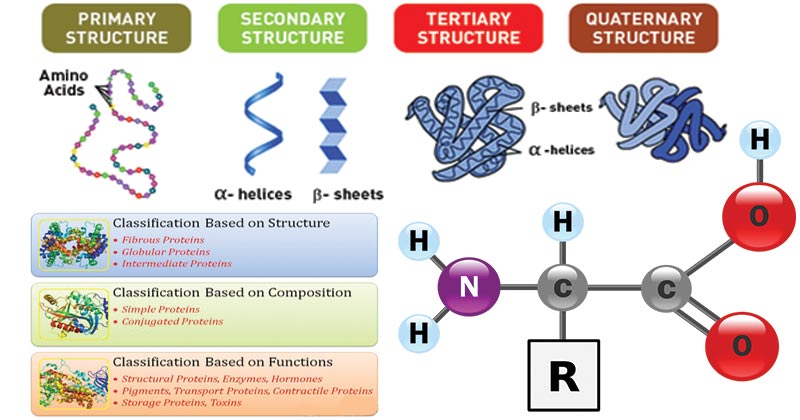What is the difference between protein and enzyme?
Proteins and enzymes are biomolecules that play a vital role in the body. Are proteins and enzymes the same thing? Well, not all proteins function as enzymes, and not all enzymes are chemically made.
The core difference between protein and enzyme is that protein is involved in the formation of structures, transportation, and catalysis whereas enzyme is a biological catalyst.
Read More: Difference between Nitrification and Denitrification

Comparison Table between Protein and Enzyme
| Basic Terms | Protein | Enzyme |
| Description | It is a class of nitrogenous compounds which compose of one or more long chains of amino acids | It is a substance produced by an organism that speeds up a biochemical reaction |
| Importance | Types of macromolecules in the body | Type of proteins in the body |
| Structure | Either globular or fibrous proteins. | They are globular proteins |
| Classification | Grouped based on the chemical composition | Grouped based on their function |
| Function | Tend to form structures, catalyze biochemical reactions and regulate biological processes | Tend to catalyze biochemical reactions |
What Is a Protein?
Protein is biological macromolecules that are polymers of amino acids. The core function of proteins is enzyme catalysis, transport, support, defense, regulation, and storage.
The structure of proteins can be expressed as primary, secondary, tertiary, and quaternary levels.
The presence of amino acids in the sequence of proteins determines their function and structure. Protein synthesis occurs during both transcription and translation.
What Is An Enzyme?
An enzyme is a globular protein that acts as a biological catalyst. It catalyzes a biochemical reaction by reducing the activation energy of the reaction.
Hence, they increase the rate of reaction. Enzymes tend to exhibit high specificity to molecules when binding to it.
Apenzyme is inactive enzymes but it can be activated by cofactors. Holoenzymes are activated enzymes that bind on the substrate.
Enzymes can be denatured when subjected to high temperatures and unfavorable pH conditions.
Main Difference between Protein and Enzyme In Point Form
- Protein is a class of nitrogenous organic compounds whereas enzyme is a biological catalyst.
- Enzymes are micromolecules whereas proteins are macromolecules that comprise of one or two long-chain amino acids
- Enzymes are a type of proteins while proteins are a type of macromolecules in the body
- Proteins are either globular or fibrous proteins while enzymes are globular proteins
- Enzymes are classified based on their function whereas proteins are classified based on their chemical composition
- Enzymes tend to catalyze biological processes while proteins form structures and regulate biological processes.
Similarities between Proteins and Enzymes
- Both are types of biomolecules in the body
- Both are made of amino acids chain
- Both are expressed with the use of genes
Frequently Asked Questions (Proteins vs Enzymes)
Are Proteins and Enzymes the Same Thing?
No. To break a protein down into its amino acids you will need enzymes. Enzymes are biological molecules (proteins) that act as catalysts and help complex reactions occur everywhere in life.
Are All Hormones Proteins?
Yes. One major class of hormones is the Protein. Peptides and modified amino acids are hydrophilic (and mostly large) hormone molecules that bind to receptors on the surface of “target” cells.
What Are Enzymatic Proteins?
Enzymatic proteins, or enzymes, are proteins that speed up chemical reactions in the body. They can make the reaction happen a million times faster. They do this by lowering some energies and raising the ground state energy.
You May Also Like:
Comparison Video
Summary
The core difference between protein and enzyme is that protein tend to form structures and regulate biological processes whereas enzyme is a biological catalysts that speed up chemical reaction.
More Sources and References
- How Proteins Work. National Library Medicine
- How Enzyme Work. Live Science